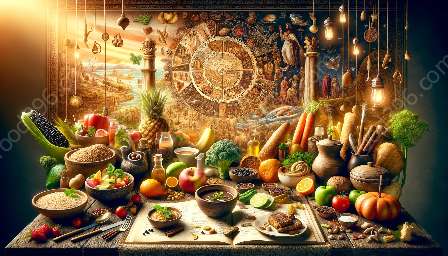Vegan and vegetarian cultures have a rich history that spans centuries and continents, showcasing the evolution of plant-based diets and lifestyles. From ancient civilizations to modern practices, the impact of these dietary choices has been significant in shaping culinary traditions and societal norms.
Ancient Vegetarian Cultures
The roots of vegetarianism can be traced back to ancient cultures, where philosophical and religious beliefs often influenced dietary practices. For example, in ancient India, the concept of ahimsa, or non-violence, played a central role in the development of vegetarianism. Followers of Jainism and Buddhism practiced strict vegetarianism as a way to avoid causing harm to living beings.
Similarly, in ancient Greece, the philosopher Pythagoras and his followers advocated for a plant-based diet based on ethical and moral principles. Their beliefs in harmony and the interconnectedness of all life led to the establishment of vegetarian communities and the promotion of vegetarianism.
Medieval and Renaissance Period
During the medieval and Renaissance periods, vegetarian and vegan cultures continued to thrive, albeit often in smaller pockets and influenced by individual beliefs and regional traditions. In some parts of the world, such as parts of India and the Middle East, vegetarianism remained intricately linked with religious and cultural practices, while in Europe, the concept of vegetarianism began to gain traction among certain intellectual and philosophical circles.
Notably, the Renaissance saw the resurgence of interest in Greek and Roman philosophical ideas, leading to a renewed fascination with vegetarianism as a lifestyle choice rooted in ethical reasoning and personal health.
Modern Vegan and Vegetarian Movements
The 19th and 20th centuries witnessed the emergence of organized vegetarian movements, advocating for ethical, environmental, and health considerations. The establishment of vegetarian societies, publications, and advocacy groups played a pivotal role in spreading awareness and promoting the benefits of plant-based diets.
As the concept of veganism began to take shape, propelled by the ethical treatment of animals and environmental concerns, individuals and communities around the world embraced this lifestyle. This period marked a significant shift in the mainstream perception of vegetarianism and veganism, with an increasing number of people adopting plant-based diets for ethical and health reasons.
Influence on Culinary History
The historical evolution of vegetarian and vegan cultures has left a lasting impact on culinary history. From the development of plant-based cooking techniques to the creation of signature dishes, the influence of vegetarian and vegan practices can be seen in diverse cuisines around the world.
Moreover, the rich tapestry of vegetarian and vegan cultures has contributed to the diversity and innovation within culinary traditions, inspiring chefs and cooks to explore the creative potential of plant-based ingredients and cooking methods. The fusion of traditional vegetarian recipes with contemporary culinary trends has further elevated the status of plant-based cuisine in the global gastronomic landscape.
Vegan Cuisine History
The history of vegan cuisine is closely intertwined with the evolution of vegetarian and vegan cultures. As plant-based diets gained popularity and recognition, the development of dedicated vegan recipes and culinary techniques flourished, leading to the creation of a distinct vegan culinary heritage.
From the early exploration of plant-based substitutes for animal products to the modern advancements in vegan cooking, the journey of vegan cuisine reflects the ingenuity and creativity of individuals and communities dedicated to promoting a compassionate and sustainable way of eating.

